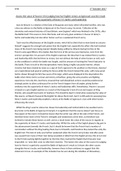H/W 3rd October 2017
Assess the value of Source 4 for judging how far English victory at Agincourt was the result
of the superiority of Henry V’s tactcs and leadership
Jean de Waurin is a relaton of the Duke of Burgundy and many other infuental families, who was
a key eye witness to the Batle at Agincourt in the French camp. He wrote ‘Collection of the
chronicles and ancient histories of Great Britain, now England’ which was fnished in the 1470s, afer
the Batle itself. This source is from that book, and not only gives evidence in favour of Henry’s
tactcs and leadership, but also other factors such as a weakened French army.
‘Such was the efectveness of the English arrows, which fell so thick that no man dared to uncover
himself’ suggests the strength and power that the English had, especially the efect this had involved
many of the French men being injured. Despite being writen by Waurin during his tme at the
French camp aged ffeen, this implies that the force of the arrows was impressive, even from the
enemy’s perspectvee his account of the English expresses the idea that it was indeed Henry’s tactcs
and leadership skills that led them to victory, but not without the help of other factors as well, such
as the conditons in which the batle was fought, and the amount of training the French had prior to
the batle. There is truth to this interpretaton: Henry being a highly successful warrior, whose
victories had been viewed by many as a sign of God’s approval to his positon on the throne, deemed
very inspiratonal and good at unitng his forces whilst the French lacked this unity, with many great
tactcs shown through his frst few years of his reign, which were displayed in the days before the
batle when Henry led to survival and victory at Harfeur, giving the army practce and fghtng
experience. Not only this, but Henry ensured that well-disciplined archers would be positoned at
strategic points to allow contnuous fre on the French happen from all angles, giving further
evidence into the superiority of Henry’s tactcs and leadership skills. Nonetheless, Waurin’s account
is based on a pro-English opinion as a result of the Burgundy’s lack of trust and respect of King
Charles, who would have bursts of madness. This should be kept in mind when assessing the value of
this source, as Waurin favoured the English far above the French, but it is stll useful in assessing how
Henry’s tactcs and leadership enabled a victory at the Batle of Agincourt, even with other factors
infuencing the result.
Whilst the King’s warrior status has shown his leadership and tactcal skills to be excellent and a
key factor in the Batle of Agincourt triumph, it is signifcant that this source doesn’t just focus on
that aspect of the evente it should be known that the writer was stll on the side of the French, and
therefore knew more of the French’s strengths and weaknesses at the tme, so therefore was
inclined to include these factors as well, and as a result lower the value of the source in regards to
the superiority of Henry V’s tactcs and leadership. Whilst the unity of the English played a big part in
the advancement towards the French, but it should be known that the French had a number of
commanders without the King leading them due to ill-health, and therefore they lacked the unity the
English had. This lack of unity was further weakened when the French army broke rank afer panic
was caused from many of their men being wounded or killed from the English arrowse this in turn led
to the French packing tghtly together by the tme they reached the English that it became near
impossible to ‘raise their arms to trike their enemies.’ This lowers the value of the source for judging
how far Henry’s superiority caused the Batle of Agincourt’s result as it shows the other causes
alongside Henry’s tactcs and leadership, however there is there evidence to suggest that this
statement is true. An example of this includes how he won during the rebellion at Shrewsbury,




